More Drone Laws Floated

WASHINGTON—Drone safety is winding its way through several legislative channels, including House and Senate bills reauthorizing the Federal Aviation Administration, as well as a standalone from a bipartisan collection of U.S. senators.
Sens. Mark R. Warner (D-Va.), John Hoeven (R-N.D.), Catherine Cortez Masto (D-Nev.), and Dean Heller (R-Nev.) rolled out the “Safe Drone Act of 2017” to “ensure the U.S. is well positioned to keep pace with the technology so this development doesn’t just go overseas,” Warner said in a statement announcing the bill. Among other action items, the legislation would instigate college training tracts, a spectrum coordination group, air traffic management and security recommendations.
It would override a recent court decision striking down the FAA’s drone registration rule, a case brought about by a model airplane enthusiast. The “Safe Drone Act” would authorize the FAA to require drone registration while providing exemptions for model aircraft. It would also extend federal authorization of FAA-designated drone test sites through 2024, and allocate $14 million for research and development at these locations.
The House FAA bill—the “21st Century Aviation Innovation, Reform, and Reauthorization,” or AIRR, received attention for its proposal to privatize air traffic control. Introduced June 21 by House Transportation and Infrastructure Committee Chairman Bill Schuster (R-Pa.), AIRR also addresses drone registration and licensing as well as operator qualifications. It also lays out a certification framework for “Unmanned Traffic Management” facilitates as well as a waiver process for low-risk UTMs.
Committee markup on AIRR is schedule for Tuesday, June 27 at 10 a.m. Eastern.
The Senate bill calls for the formation of an FAA advisory committee to analyze “risk-based, consensus safety standards related to the safe integration of small unmanned aircraft systems into the national air-space system.” It also addresses identification standards, training programs, airport safety, shipping applications and more.
The Senate version also takes on enforcement, authorizing fines and up to a one-year prison sentence for drone operators who “knowingly or recklessly” interfere with manned flight operations that put pilots and passengers at risk. Drone operators who cause death and/or injuries would be subject to criminal prosecution.
The bill also would terminate support for the FAA drone test sites Sept. 30, 2021.
Both bills make exclusionary provisions for model aircraft.
Also see...
June 26, 2017, “FAA Sets Up Drone Remote-ID Committee”
The group’s task is to come up with rules for identifying, categorizing and recommending technologies for remotely identifying and tracking drones.
Get the TV Tech Newsletter
The professional video industry's #1 source for news, trends and product and tech information. Sign up below.
